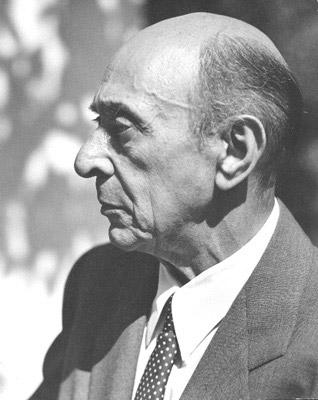"אינני גרמני, גם לא אירופאי, אולי אפילו לא בן-אדם. אני יהודי".
החוקר מייקל קייטר מספר על אחד ממלחיני הסרטים החשובים בגרמניה, גיאורג הנצשל (שהלחין, בין היתר את "הבארון מינכהאוזן" משנת 1943 בהפקת גבלס), אשר העלה את הטענה כי כבר בתחילת שלטון הרייך השלישי ניתן היה להבחין בהיעלמותם של המוסיקאים היהודים. לשאלתו של קייטר, כיצד, ענה הנצשל : "משום שקבוצת הכינורות הלכה והידלדלה". אין ספק שמידת הבולטות של היהודים בתרבות הגרמנית בכלל ובתחום המוזיקה בפרט בראשית המאה העשרים היתה ללא כל פרופורציה לחלקם המזערי באוכלוסיה (פחות מאחוז אחד).
המלחמה ביהודים קיבלה ביטוי בכל תחומי החיים, על בסיס תפיסותיו הגזעניות של אדולף היטלר. בתחום המוסיקה, היטלר ייחס ליהודים חוסר יכולת להגיע להישגים מקוריים או יצירתיים בשל ניוונם הגזעי כביכול. מסיבה זו, טען היטלר, מתרברבים היהודים במנצחים היהודים שזכו לתהילה, בזכות מאמרי הביקורת שנכתבו בידי יהודים בעיתונות היהודית. מלבד היהודים, סומן המודרניזם כאויב נוסף של המוסיקה הגרמנית. המודרניזם הוגדר על ידי הנאצים בצורה מעורפלת וקושר תמיד ליהודים ובולשביקים. הסגנון המודרניסטי שהתאפיין במלודיה א-טונאלית (היעדר צליל דומיננטי בסולם) נתפס כמכוער ובלתי מובן. ההרמוניות של המוסיקה המודרנית אשר נבנו באמצעות דיסוננטים לא פתורים - התפרשו על ידי הנאצים כעיוות של המציאות. שתי צורות הביטוי הללו, אשר מרדו בסולמות (סדרות צלילים) המקובלים נתפסו כמקבילות לאנרכיזם בפוליטיקה.
בנובמבר 1933, השנה הראשונה לשלטון הרייך, הוקם ה- Reichsmusikkammer (המשרד למוסיקה של הרייך), גוף שהוביל את ניסיונות ההשתלטות של המשטר הנאצי על עולם המוזיקה. ד"ר יוסף גבלס הודיע על הקמתו ומינה את ריכרד שטראוס כנשיאו הראשון. שטראוס היה המלחין המפורסם ביותר בגרמניה, מי שבמידה רבה סימל את המוסיקה הגרמנית, ומינויו הוסיף הדר וכבוד למוסד החדש. ממועד זה ננקטו צעדים שונים ומגוונים שמטרתם היתה יצירת מנגנון שליטה מוחלט על עולם המוסיקה בגרמניה וטיהור התחום מהשפעות יהודיות. בתגובה לכך ייסד קורט זינגר, שהיה סגן מנהל האופרה של ברלין, את ה"קולטורבונד" (אגודה לתרבות של יהודים גרמנים) שמצד אחד איפשר לאמנים יהודים להמשיך להופיע וליצור, ולקהל יהודי להמשיך וליהנות מיצירות אמנות; אך מצד שני יצר גטו נפרד של עולם התרבות היהודית בתוך גרמניה הנאצית, והיה למעשה הארגון היהודי הראשון שפעל תחת פיקוח ישיר של הנאצים.
כמו בתחומים אחרים, גם בתחום המוסיקה השקיעו הנאצים מאמצים רבים בבניית תילי תילים של הסברים ותיאוריות לגבי השפעתם המשחיתה של היהודים. נביא כאן שתי דוגמאות לפירסומים אופיניים.
הדוגמא הראשונה הינה ספר מ – 1939 שכתב קרל בלסינגר, שנקרא "מנדלסון, מיירביר, מאהלר. שלושה פרקים על היהדות במוסיקה כמפתח להבנת ההיסטוריה של המוסיקה במאה ה-19". העובדה שפליקס מנדלסון – ברתולדי גדל כנוצרי לאחר שאביו אברהם המיר את דתם של בני משפחתו לנצרות, לא הפריעה לבלסינגר לכלול את יצירות המלחין הידוע והנערץ ברשימות של המוזיקה הנגועה. כתיבתו של בלסינגר מאופיינת באיבה בלתי מרוסנת ליהודים תוך שימוש ברעיון הגזעני של יהדות עולמית ששמה לה למטרה להדוף את התרבות העולמית, ובייחוד את התרבות הגרמנית. ספר זה מלמד על השאיפה הכפייתית של האנטישמיות "המשכילה" בגרמניה להכפיש ולנטרל ככל האפשר את הנוכחות היהודית מכל תחום, כמו גם על הנסיון לשכתב את ההיסטוריה באופן שמטהר מכל רמז לתרומה יהודית בתחום כלשהו.
הדוגמה השניה מהווה מעין אנציקלופדיה של מוזיקאים יהודים שיש להתנזר מיצירותיהם. הספר "לקסיקון היהודים במוסיקה" נכתב על ידי שני מוסיקולוגים: תאו שטנגל והרברט גריק. פרסום זה הציג רשימה של מוסיקאים יהודים ויצירות, מן העבר ומן ההווה, והיווה קטלוג של ההשפעה השלילית של המוסיקאים היהודים. ברשימה הופיעו שמות של מלחינים, מבצעים, מוסיקולוגים ומנצחים. הדוגמה הבאה מתוך הספר היא בבחינת עדות ליעדים הרחוקים אליהם הגיעו העורכים. מקס ברוד (Brod), שנולד בפראג ב- 1884 זוכה לחמש עשרה שורות של ביקורת. יצירתו המוסיקלית של מקס ברוד היא משנית ביחס ליצירתו בתחומים אחרים, אפילו זניחה, ובכל זאת הוא הוכנס לפנתאון של דמויות בולטות בתרבות העולם כאמן העוסק במוסיקה שיש להתנזר ממנה, בגלל הקשר ההדוק שלו עם פרנץ קפקא ורשימה מכובדת של ספרים ומאמרים שהוא כתב.
מוסיקאים גרמנים ממוצא יהודי בעלי מוניטין בין לאומי לא המתינו ליישום הרעיונות המובעים בפרסומים הנאציים ועזבו את גרמניה בסמוך לעליית הנאצים לשלטון. המנצח המפורסם אוטו קלמפרר ברח מגרמניה לשווייץ ב-1933 ומשם לארה"ב. מנצח אחר, ברונו ולטר היגר לאוסטריה ב-1933 ועם סיפוחה ע"י הנאצים ב-1938 היגר לארה"ב. אך המעניין והשנוי במחלוקת מבין המוסיקאים היהודים שהיגרו כבר ב-1933 הוא המלחין ארנולד שנברג. חייו ויצירתו של שנברג משקפים את השינויים באירופה של זמנו. אולי משום כך, ובוודאי בשל הקושי בהאזנה ליצירותיו נכתב עליו הרבה אך יצירותיו אינן מהפופולריות ותזמורות אינן מרבות לבצע אותן. עם זאת, השפעתו על המוזיקה הקלאסית של המאה העשרים מכרעת והוא נמנה על חשובי המלחינים המודרניים.
ארנולד שנברג נולד בשנת 1874 בוינה למשפחה דלת אמצעים ממוצא הונגרי. אימו פולינה היתה בת למשפחת חזנים ואביו סמואל היה סנדלר. כשהיה בן שמונה החל ללמוד לנגן בכינור ומאוחר יותר לימד את עצמו לנגן על צ'לו. כשהיה בן עשר כבר החל לחבר יצירות קטנות לשניים, שלושה וארבעה כלים. בשנת 1891, לאחר מות אביו, נאלץ להפסיק את לימודיו הרשמיים ומצא עבודה כשוליה בבנק על מנת לשאת בעול פרנסת המשפחה. כל עוד היה אביו בחיים, נשמר בבית זכר למנהגים יהודיים, אך משנעשה ארנולד ראש משפחה בטרם עת, נעלמה המסורת כליל מחיי המשפחה. כבר בשנות העשרה לחייו, הפך התנ"ך בתרגומו של לותר למלווה קבוע של שנברג, וב- 18988 הוטבל ארנולד שנברג לנצרות. בשנה זו זכה שנברג להכרה בזכות יצירה רביעיה שכתב. בתקופה המוקדמת של כתיבתו הושפע שנברג מהמסורת הרומנטית ובמחלוקת הגדולה בין אוהדי ברהמס שנחשב מסורתי יותר לבין וואגנר שנחשב לחדשני, מצא עצמו שנברג דווקא בין אוהדיו של וואגנר שהיה אנטישמי קיצוני.
בתחילת המאה העשרים החל ללמד ביחד עם שני תלמידיו הבולטים, אנטון וברן ואלבן ברג שהפך למוביל האסכולה הוינאית. לשנברג היה מוניטין יוצא מן הכלל כמורה, את ספרו "התיאוריה של ההרמוניה" הקדיש לתלמידיו, מהם לדבריו, למד את הספר. הוא ביקש ללמד כל עיקרון מהבסיס מבלי לכפות כללים נוקשים. תהליך הלמידה היה בעיניו כזה שחייב את התלמיד והמורה במידה שווה. אם התלמיד מוצא טכניקה שהמורה אינו מכיר, על המורה להיות מוכן למחול על כבודו, משום שהוא אינו חסין לטעויות. גישתו הדידקטית של שנברג הפכה עם הזמן למופת.
עם פרוץ מלחמת העולם הראשונה ניסה שנברג להתקבל לשירות צבאי, תחילה נדחה, אך בדצמבר 1915 התקבל לשירות המילואים. כבר ביוני 1916 שוחרר בשל מחלת האסטמה ובריאות כללית רופפת. רבים מתלמידיו של שנברג אבדו במלחמה והדבר השפיע עליו באופן אישי. ב-1917 חזר לשירות צבאי קצר וקל יותר מן הקודם.
שנברג היה שחיין חובב ונהג לבלות את חופשותיו בחיק משפחתו בעיירת הקיט מאטזה השוכנת על גדות אגם. בשנת 1921, בחופשתו החמישית בעיירה, החליט לעזוב את העיירה בעקבות צו מקומי אנטישמי שדרש מן האורחים להציג הוכחות כי הם נוצרים. למרות יכולתם להוכיח כי הוטבלו לנצרות בחרו שנברג, בני משפחתו וכמה מתלמידיו שהתלוו אליו לעזוב את העיירה. שנברג ראה בתקרית זו סימן לבאות.
במכתב למלחין פרוצ'ו בוזוני ממועד לא ידוע, פירט שנברג את חזונו האמנותי:
"אני שואף ל: חופש מוחלט מכל הצורות,
מכל הסמלים
של לכידות
ושל הגיון.
לפיכך:
הלאה הפתרונות כמוטיב.
הלאה ההרמוניה
כבטון או אבן בניה.
ההרמוניה היא ביטוי
ותו לא.
לפיכך:
די לפאתוס!
די לפרטיטורות הארוכות הכוללות עשרה צלילים, לבניית מגדלים
זקופים ומוגבלים, סלעים ושאר קשקושים מאסיביים.
על המוסיקה שלי להיות
קצרה.
מצומצמת! בשני צלילים: לא בנוי, כי אם מבוטא!
מניפסט זה מבטא את שאיפתו של שנברג ליצור אמנות טהורה תוך ביטול ההיררכיות הצליליות. כאשר הלך בוזוני לעולמו, מונה שנברג כמורה באקדמיה של ברלין ממנה פוטר בשנת 1933 בשל יהדותו. באותה שנה היגר שנברג מגרמניה, עבר לפריז בה ערך טקס סמלי של חזרה ליהדות בנוכחות מארק שאגאל. לסיכום, את הביוגרפיה המוסיקלית של שנברג נהוג לחלק לארבע תקופות:
1897-1908: יצירות המושפעות מהמוסיקה הרומנטית של המאה ה-199, ביניהן שישיית המיתרים "ליל הוד”, אורטוריית "שירי גורה" והפואמה הסימפונית "פלאס ומליסנד".
1909-1913: תקופה אותה ניתן לאפיין כאקספרסיוניסטית בה כתב שנברג כי האמנות מבוססת על התת-מודע. היצירה הבולטת בתקופה זו היא "פיירו הסהרורי" ביצירה זו השתמש שנברג בטכניקת ה- Sprechstimme, השירה הדיבורית. בשנת 1910 כתב את "התאוריה של ההרמוניה" ובו הוא מנתח את המוסיקה הטונאלית מנקודת מבטו.
1921-1932: לאחר שנים של שקט יצירתי יחסי והתבוננות פנימית, החל ליצור שנברג על פי שיטת 12 הטונים בסולם הכרומטי (סולם בו ישנם 122 צלילים והרווח בין כל צליל לזה הבא אחריו הוא של חצי טון) וסלל דרך חדשה ליצירות א-טונאליות (יצירות בהן אין תחושה של צליל דומיננטי המהווה בסיס למלודיה). היצירה המשמעותית בתקופה זו, שנכתבה לקראת סופה היא האופרה "משה ואהרון”. הבחירה במי שנחשב למייסד העם היהודי כנושא לאופרה מצביעה על התקרבותו ההולכת וגוברת של שנברג ליהדות.
1933-1951: תקופה זו, שהחלה בטקס סימלי שנערך בצרפת בו שב ליהדות, מתאפיינת בגיוון ובעיסוק אינטנסיבי בנושאים היהודיים ביצירתו. יצירה בולטת בתקופה זו היא "הניצול מורשה" בה מוקראת עדות של ניצול שואה (המבוססת על זכרונותיו הקטועים) בסגנון ה- Sprechstimmee בשילוב עם הקומפוזיציה המוסיקלית של שנברג הכוללת ליווי תזמורתי ומקהלת גברים. יצירה זו נחשבת לאחת היצירות הקלאסיות החשובות שנכתבו לאחר השואה ונגעו בנושא באופן ישיר.
רבים מן הכותבים התייחסו למורכבות העצומה של זהותו: הוא נולד כיהודי, יהדותו נכפתה עליו, והוא שב ולקח את יהדותו על עצמו ובחר בה. במובן זה הוא גילם בשנות חייו ובבחירותיו פנים שונים של ההוויה היהודית. מבחינת הלאום, קשה לומר שראה עצמו קשור לאומה מסויימת, אך כבר ב-1924 הביע תמיכה ברעיון הקמת מדיה ליהודים. שנברג ראה עצמו נאמן לתפיסת עולמו האמנותית לאורך כל חייו, אך זהותו הלאומית והדתית היתה נתונה לשינויים לאורך השנים.









